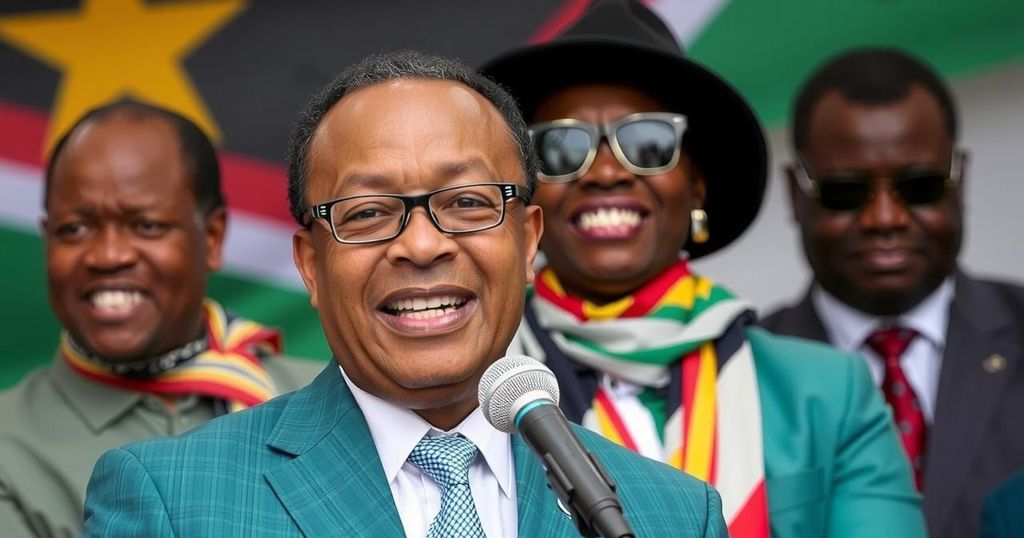Namibia Elections: Swapo Experiences Decline Amidst Rising Opposition Strengths

Namibia’s Swapo party retained the presidency but significantly lost seats in parliament, reflecting a trend of governing parties in sub-Saharan Africa facing electoral challenges. Amidst widespread public discontent over economic mismanagement and corruption, opposition parties are increasingly finding success in elections. This suggests a growing demand for accountability and a more active civil society in the region.
In Namibia’s recent elections, the ruling party, Swapo, secured the presidency with 57% of the vote, marking a significant yet diminished hold on power after over 30 years. Despite this victory, Swapo faced backlash from opposition groups, citing logistical issues and irregularities during the electoral process. Interestingly, Swapo’s performance in parliamentary elections declined sharply, with the party losing 12 out of 63 seats, raising questions about its electoral strategy. The broader sub-Saharan region has witnessed a trend of electoral setbacks for incumbents this year, reflecting growing public discontent fueled by economic downturns, corruption frustrations, and the emergence of more organized opposition parties.
This year has been pivotal for various African governing parties that have traditionally maintained a strong grip on power. Notably, the Botswana Democratic Party, which had dominated since the country’s independence in 1966, suffered a devastating defeat, crashing from 38 seats to just four in the parliament. Similarly, in Mauritius, the ruling Alliance Lepep coalition saw its representation sharply reduced, only winning 27% of the vote. Opposition parties across multiple nations, including Senegal and Somaliland, capitalized on public outrage over governmental mismanagement to secure significant victories.
The 2024 elections are characterized by a notable shift in very stable political landscapes, underscoring a growing trend of widespread opposition success. Factors contributing to these shifts include heightened public awareness of corruption, ineffective governance, and economic grievances. Coupled with the pressure from civil society and organized protests, these trends have profoundly altered the political dynamics in several countries. For example, the youth-led protests in Kenya against President Ruto’s regime highlighted the influential role of economic discontent in swaying public opinion.
Notably, the opposition parties have demonstrated an adaptive strategy by learning from past electoral cycles. In Mauritius, systematic monitoring of the electoral process aided in safeguarding votes, whereas in Botswana, a coalition of opposition parties collectively retracted support from the long-standing ruling party. As sub-Saharan Africa approaches more elections in the coming years, including those in Ghana and Malawi, the political landscape is likely to encounter even further shifts, particularly if economic mismanagement continues.
The recent electoral developments in Africa challenge the narrative that the continent is increasingly succumbing to authoritarianism. Instead, they illuminate a landscape of democratic resilience where civil society and active citizenship have led to significant political change. The events across the continent indicate a powerful desire for accountability and governance that genuinely reflects the will of the people, which could serve as a vital case study for democratic movements worldwide.
The elections in Namibia signify a broader trend observed across sub-Saharan Africa where incumbent ruling parties are increasingly facing electoral challenges. In 2024, a number of African countries, including Botswana and Mauritius, witnessed significant losses for governing parties, suggesting a shift in political sentiments driven by public dissatisfaction with governance and economic hardships. The increasing assertiveness and organization of opposition parties are pivotal in this shifting political landscape, as opposition leaders capitalize on citizen grievances against corruption and ineffective management. This phenomenon highlights an evolving dynamic within African politics, characterized by heightened demands for accountability and democratic governance.
In summary, the recent elections in Namibia and across sub-Saharan Africa signal a critical shift in political dynamics, marked by increasing opposition successes against traditional ruling parties. Economic grievances, corruption, and organized civil responses have substantially influenced voter behavior, revealing a strong demand for accountability. As we look towards future elections, these trends may continue to foster political change, demonstrating a resilience within African democracies even amidst global democratic decline. This evolving context not only redefines governance in many nations but also presents valuable lessons regarding the enduring power of citizen activism and democratic participation.
Original Source: www.bbc.com







